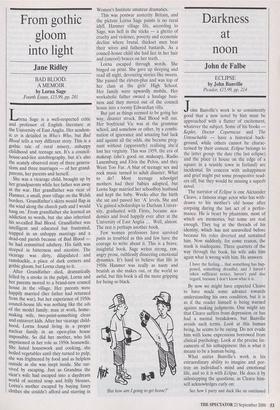From gothic gloom into light
Jane Ridley
Lorna Sage is a well-respected critic and professor of English literature at the University of East Anglia. Her academ- ic cv is detailed in Who's Who, but Bad Blood tells a very different story. This is a gothic tale of rural misery, unhappy childhood and teenage sex. It's a council- house-and-lice autobiography, but it's also the acutely observed story of three genera- tions and three marriages — of her grand- parents, her parents and herself.
She was a vicarage child, brought up by her grandparents while her father was away at the war. Her grandfather was vicar of Hanmer, a small, poor village on the Welsh borders. 'Grandfather's skirts would flap in the wind along the church path and I would hang on.' From grandfather she learned an addiction to words, but she also inherited his so-called Bad Blood. Grandfather was intelligent and educated but frustrated, trapped in an unhappy marriage and a dead-end parish because of Bad Blood he had committed adultery. His faith was steeped in bitterness and nicotine. The vicarage was dirty, dilapidated and ramshackle, a place of dark corners and gothic gloom, but Lorna clung to it.
After Grandfather died, dramatically felled by a stroke in the pulpit, Lorna and her parents moved to a brand-new council house in the village. Her parents were happily married (her father had returned from the war), but her experience of 1950s council-house life was nothing like the ads of the model family: man at work, home- making wife, two-point-something clean and extravert kids. After her vicarage child- hood, Lorna found living in a proper nuclear family in an open-plan house impossible. So did her mother, who felt imprisoned in her role as 1950s housewife. She hated housework and cooking, she boiled vegetables until they turned to pulp, she was frightened by food and as helpless outside as she was inept inside. She sur- vived by escaping. Just as Grandma the vicar's wife had escaped into a daydream world of scented soap and frilly blouses, Lorna's mother escaped by buying fancy clothes she couldn't afford and starring in Women's Institute amateur dramatics.
This was postwar austerity Britain, and the picture Lorna Sage paints is no rural idyll. Hanmer village life, according to Sage, was hell in the sticks — a ghetto of cruelty and violence, poverty and economic decline where brutal, thickset men beat their wives and fathered bastards. As a council-house child she had lice in her hair and (uncool) braces on her teeth.
Lorna escaped through words. She binged on print. She gave up sleeping and read all night, devouring stories like sweets. She passed the eleven-plus and was top of her class at the girls' High School. Her family were upwardly mobile. Her workaholic father owned a haulage busi- ness and they moved out of the council house into a roomy Edwardian villa.
But just as things seemed to be going her way, disaster struck. Bad Blood will out. Her boyfriend Vic was at the grammar school, and somehow or other, by a combi- nation of ignorance and amazing bad luck and against all the odds, she became preg- nant without (apparently) realising she'd lost her virginity. This was 1959, the era of makeup (she's good on makeup), Radio Luxemburg and Elvis the Pelvis, and they Went Too Far. A blur of teenage sex and rock music turned to adult disaster. What to do? Most teenage schoolgirl mothers had their babies adopted, but Lorna Sage married her schoolboy husband and kept the baby. Weeks after the birth she sat and passed her 'A' levels. She and Vic gained scholarships to Durham Univer- sity, graduated with Firsts, became aca- demics and lived happily ever after at the University of East Anglia ... Well, almost. The rest is perhaps another book.
Few women professors have survived pasts as troubled as this and few have the courage to write about it. This is a brave, insightful book. Sage writes strong, raw, angry prose, ruthlessly dissecting emotional dynamics. It's hard to believe that life in 1950s Hanmer was really as nasty and brutish as she makes out, or the world so awful, but this book is all the more gripping for being so black.
But how am I going to get home?'






















































































 Previous page
Previous page